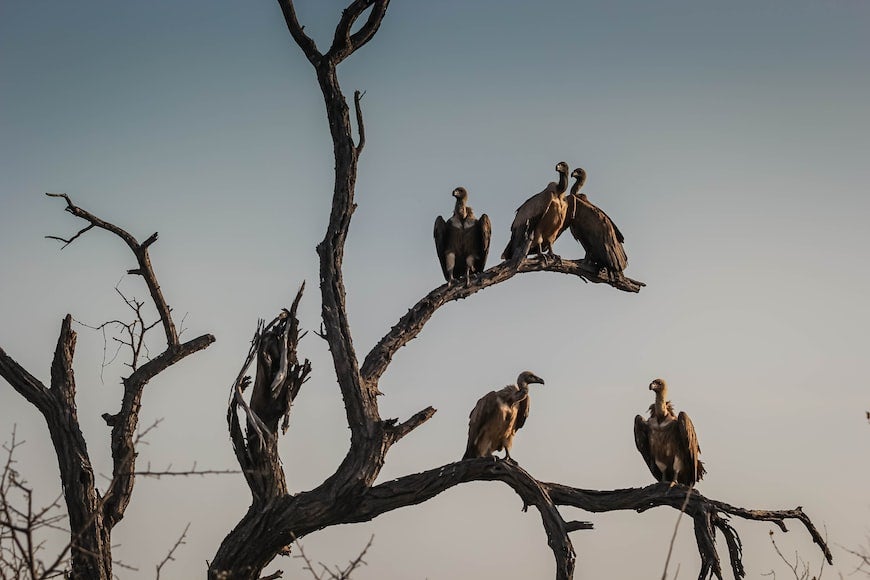Can GPS tracking reduce cases of vulture poisoning in Zimbabwe?
‘Eye in the sky’ initiative will use tech to pinpoint hotspots and respond rapidly to cases of poisoning

Your support helps us to tell the story
From reproductive rights to climate change to Big Tech, The Independent is on the ground when the story is developing. Whether it's investigating the financials of Elon Musk's pro-Trump PAC or producing our latest documentary, 'The A Word', which shines a light on the American women fighting for reproductive rights, we know how important it is to parse out the facts from the messaging.
At such a critical moment in US history, we need reporters on the ground. Your donation allows us to keep sending journalists to speak to both sides of the story.
The Independent is trusted by Americans across the entire political spectrum. And unlike many other quality news outlets, we choose not to lock Americans out of our reporting and analysis with paywalls. We believe quality journalism should be available to everyone, paid for by those who can afford it.
Your support makes all the difference.By Nokuthaba Dlamini for Vic Falls Live
A leading African conservation organisation is exploring ways to utilise technology to curb the poisoning of vultures in Zimbabwe’s Gonarezhou National Park and Limpopo National Park in Mozambique.
The two game reserves are said to be the most affected by the poisoning of vultures.
The Endangered Wildlife Trust (EWT), which is dedicated to conserving threatened species and ecosystems in southern and east Africa, says it will use vultures as their “Eye In The Sky” to raise alerts about poisoning incidents.
Data would be transmitted from GPS-tracked vultures and sent to monitors, which will enable a more rapid response to potentially deadly incidents.
“The issue is exacerbated by the poisoning of vultures as sentinel species in association with the ivory trade, and other poaching practices, as well as targeting these birds for belief-use trade in their body parts,” said Andre Botha, the Vultures for Africa programme manager at EWT.
“Vultures are targeted as their visible presence with large numbers descending from the skies and perching near to, or feeding on poached wildlife, alerts law enforcement staff to poaching or poisoning events.
“Their remarkable sentinel function has led to the extensive persecution of vultures across the continent.”
Gareth Tate, Birds of Prey programme manager at the EWT, said the technology will result in quicker reaction to poisoning incidents.
“In essence, when a vulture is killed on a poisoning scene, the immobility triggers an alert within minutes of death, allowing us to pinpoint the sites where vultures have died and respond rapidly and decontaminate the scenes to prevent further loss of vultures and other animals that would otherwise go undetected, or be detected too late,” Tate said.
“It is sad that vultures have to die to detect some of these events, but by sending an early alert signal to us they save the lives of countless other wildlife and allow us to rescue animals that have survived these poisoning events.”
Deborah Kahatano, chief of party for USAID’s VukaNow Activity, which is supporting the EWT innovation, said one of their core objectives was to increase the application of effective tools, technologies, and approaches that mitigate wildlife crime, while also working closely with communities to address these issues.
“The vision for this work is to expand the network of GPS-tracked vultures throughout poisoning hotspots across Africa and incorporate multiple partners and landscapes to uptake the Eye in the Sky poisoning detection system, while continuing to focus on additional proactive conservation measures to address the major indiscriminate threat of poisoning,” Kahatano said.
“This includes undertaking community work and targeted workshops with traditional medicine practitioners to raise awareness around the use of poisons to harvest vulture body parts and its risks to human health, and facilitating improved judiciary and law enforcement response, leading to more arrests being made.”
The first Saturday in September marks International Vulture Awareness Day, which is intended to highlight the conservation of vultures that face a range of threats.
This article is reproduced here as part of the African Conservation Journalism Programme, funded in Angola, Botswana, Mozambique, and Zimbabwe by USAID’s VukaNow: Activity. Implemented by the international conservation organization Space for Giants, it aims to expand the reach of conservation and environmental journalism in Africa, and bring more African voices into the international conservation debate. Written articles from the Mozambican and Angolan cohorts are translated from Portuguese. Broadcast stories remain in the original language.
Read the original story here:
Join our commenting forum
Join thought-provoking conversations, follow other Independent readers and see their replies
Comments